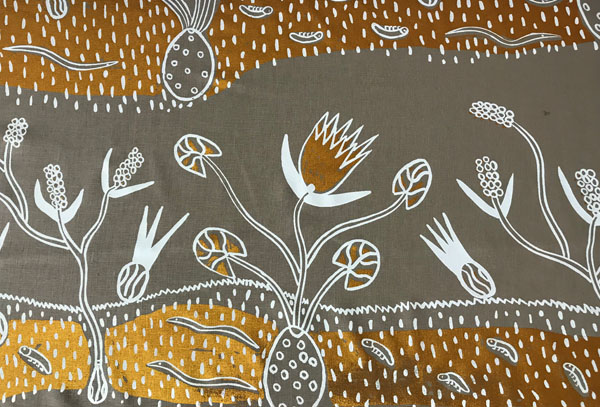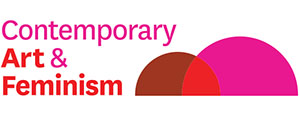
Karrang Kunred / Mother-Land
Susan Marawarr, Jennifer Wurrkidj & Deborah Wurrkidj
Opening: Friday 20th April 2018 at 6 pm
The Cross Art Projects, 20 April to 26 May 2018
Karrang Kunred/Mother-Land unites three senior Kuninjku women of the Kurulk clan who are closely related: sisters Jennifer Wurrkidj and Deborah Wurrkidj and aunt Susan Marawarr. Artistic boundaries are pushed for the first time in this exhibition by connecting traditional bark paintings, lorrkon (hollow logs) and carving, alongside experimental textile prints.
Karrang Kunred in Kuninjku means ‘mother’s homeland’ or ‘the country of my mother’. The women chose this title for their exhibition as the women share one ‘mother country’ — the stone country in West Arnhem Land, near Mumeka and Barrihdjowkkeng homelands. The Kuninjku homelands comprise rocky sandstone escarpments scattered with rock art, dense paper bark forest, freshwater rivers and seasonal floodplains. The palette of country is shown throughout this exhibition, with paintings featuring only natural pigments collected on country and the textiles mirror these hues.
In general speech, the artists refer to this country as their ‘mother’, which reveals the deep cultural connection to place. As Deborah Wurrkidj speaking about the significance of Karrang Kunred says: “We are thinking about our land. Our thoughts always return to our homeland. The old people, they taught us all this a long time ago. My father’s sisters, my mother’s mother and my aunties, they taught us, and now we know.”
This exhibition celebrates the strength and vibrancy of women’s art, revealing the artist’s knowledge of ceremony and culture and intimate connections to the surrounding bushlands, bush foods, sacred sites, ancestor spirits and everyday objects. For this reason, the exhibition includes baskets crafted and coloured from natural fibres.
The rarrk design which appears on both print and textile, is a unique interpretation of a metaphysical experience with country. The delicately gridded and finely dotted painting styles are ‘inspired by’ or reflective of ceremonial body paint designs. These are called the ‘outside' version not the 'inside’. The paintings are deeply rooted in traditional culture, but are contemporary and dynamic - Susan Marawarr in particular pushes new ways of painting and settles on a startling black and white palette perhaps to differentiate from her well-known brother John Marwurndjul, a Telstra National Aboriginal and Torres Strait Islander Art Award winner. (Marwurndjul is holding a retrospective exhibition at Museum of Contemporary Art Sydney from June 2018 a decade after his retrospective exhibition at the Museum Tinguely, Basel in 2005).
All three women are from a strong line of Kuninjku artists who live on homelands and in Maningrida, Arnhem Land. Work by the Wurrkidj sisters’ uncle James Iyuna, who taught his two nieces how to paint, is featured in collections internationally. Yet, work by Top End women artists is rarely featured in public institutions other than in large group exhibitions: Susan Marawarr featured in the acclaimed Crossing Country (curator Hetti Perkins, AGNSW 2004) and has worked with celebrated artist Judy Watson on a major commission (Sydney International Airport 2000). Certainly very little work by Kuninkju women artists has been seen in a solo context in a public museum.
But this is changing. The women of Maningrida are a large part of a lively contemporary art scene and are strong voices advocating for change—cultural, economic, environmental. Through the Babbarra Women’s Governance Group the artists are lobbying for better health services in Maningrida, for environmental protection of (against fracking, the Stingray Sisters led the way here), and supporting people's return to life on homelands.
As Jennifer Wurrkidj explains: “Us bininj (Aboriginal) mob, we are same like our country. That country is like us, and we are like that country, like family. We are just one, same like them animals, snakes, birds – any type really. And when we pass, it just goes back in like one circle, you know. Like that, that’s the story”.
Works selected by: the artists with Kate O'Hara, Maningrida Arts and Crafts and Ingrid Johanson, Babbarra Women's Centre and Jo Holder and Fiona MacDonald, The Cross Art Projects.
Image: Jennifer Wurrkidj, Kururrk Kare (Going Underground), (detail) silkscreen print (three colour), 2018. Photo: Ingrid Johanson. Courtesy Babbarra Women's Centre.

